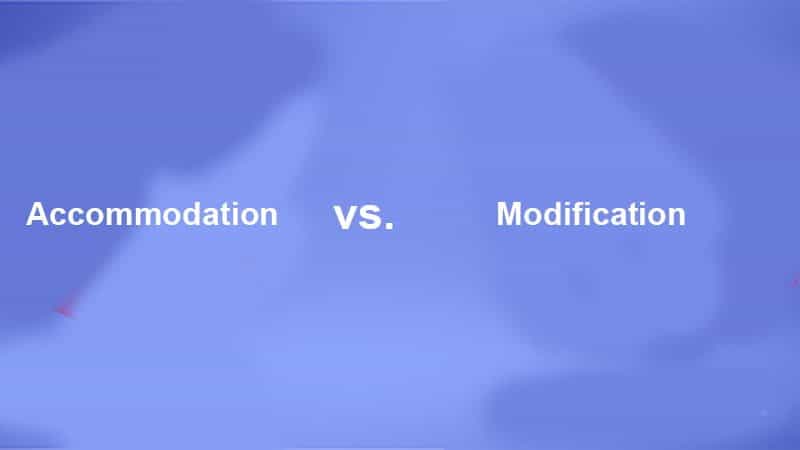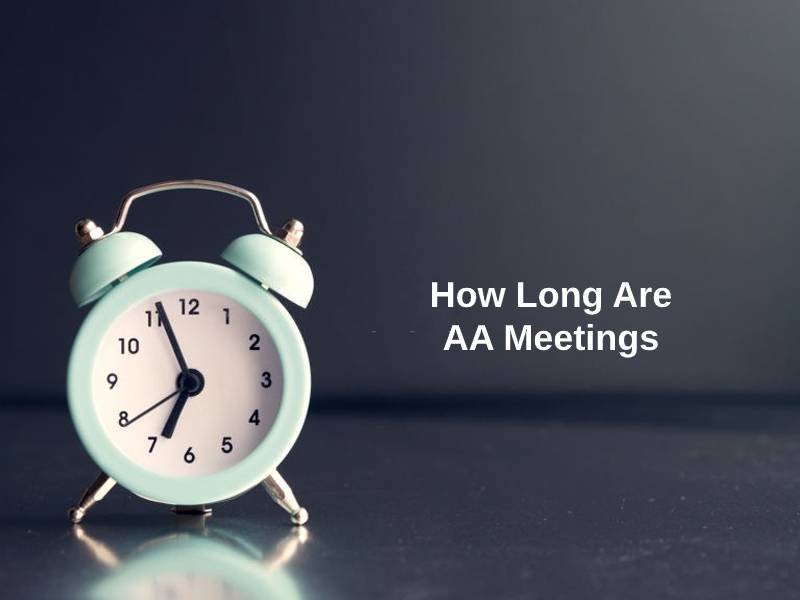Both accommodation and modification are changes to help people, especially students with special needs. However, both terms are inherently different. While accommodation refers to the changes made in the learning method, modification refers to the alterations in the curriculum.
Accommodation vs Modification
The main difference between accommodation and modification is that while accommodation changes ‘how’ the student learns, modification modifies ‘what’ they learn.

In accommodation, students with special needs learn the same things as others. However, the required modifications are made in the structure, method, or approach to learning.
On the other hand, modification refers to the positive changes made in the curriculum to make it easier for divinely abled students to grasp concepts. Here, they learn fewer things than the other students by keeping the structure and method more or less the same.
Comparison Table Between Accommodation and Modification
| Parameters of comparison | Accommodation | Modification |
| What is changed | In accommodation, the student learns the same material as others. For instance, a deaf student will attend the same lecture as others. The only difference will be the mode of learning. They rely more on visual presentations, course outlines, and notes. | In a modification, the syllabus itself is changed. They are assessed differently. That is, changes are made in ‘what’ the student learns. |
| Changes in content | Examples of modification include a different set of question papers, alternate projects, marking schemes, exemptions, etc. | In accommodation, the learning procedure is changed. That is, accommodation changes the learning mode or ‘how’ a student approaches the curriculum. |
| Learning outcomes | In accommodation, the learning outcome remains the same. Everyone learns the same syllabus and is expected to meet the same learning objectives. | In a modification, the syllabus is changed. Therefore, the learning objectives shrink proportionately. Other students and special students will not receive the same outcomes from the course. In all cases, the students with special needs will achieve only a part of the learning objectives. |
| Special classes | In accommodation, all students are encouraged to participate in special classes like art, music, dance, work experience, etc. Changes will be made in the structure, that is, the time required to complete an assignment or submit an assignment in a different format. | In a modification, the students may be exempted from such classes. |
| Testing | In accommodation, students are evaluated using the same test. The changes will be made in the exam time or mode of writing the exam. For instance, visually impaired students can use the help of a scribe or submit responses in audio format or a device. | In a modification, students are evaluated differently. They might give an altogether different examination with a reduced syllabus. Also, the correction methods or modes of evaluation will be different. |
| Examples | Examples of accommodation include audiobooks, giving special students access to spell checkers, dictionaries or calculators, etc. | Examples of modification include a different set of question papers, alternate projects, different marking schemes, exemptions, etc. |
What is Accommodation?
Accommodation refers to modifications made in the learning mode to support divinely abled students. However, they learn the same things as others learn. Just the learning method or approaches change according to circumstances.
Here, the students will receive the same knowledge and learning outcomes as others. If a course X has 10 learning objectives, both divinely abled and other students will realize all the achievements.
For instance, a visually impaired student will be given audiobooks to learn. However, the student will learn the same book as others. The only difference is the learning mode- while the visually impaired student uses an audio format of the book, others will read the hardcover version.

Other examples of accommodation include giving digital media instead of print media, books with greater font size, giving oral instructions, giving printed access or notes, visual presentations, etc.
Here, the students study the same syllabus as others. The only changes made are how they learn. This ensures they receive all course learning objectives that all other students taking the same course will get.
What is Modification?
While accommodation helps students accommodate the syllabus or the curriculum using different means, modification changes the curriculum. In a modification, students with special needs will not learn the same syllabus as others.
Here, the learning objectives will be different. The modifications made in the syllabus are necessarily negative. That is, the syllabus is trimmed. Therefore, the learning objectives will be proportionately reduced. For example, if taking a course Y has 6 learning objectives, the student might only be able to realize 3 or 4 of these. Since the curriculum is trimmed, it will adversely affect the learning objectives.
For example, students with special needs will have to learn a reduced syllabus compared to others. If others have to learn ten chapters of a specific book, students with special needs only have to study six chapters. Here, they will be evaluated based on a trimmed syllabus. Moreover, they might also be evaluated differently.
Other examples of modification include giving alternate assessments other than regular assignments others are supposed to do, learning different materials compared to others, and being excused from doing some projects or attending special classes like art education.
Main Differences Between Accommodation and Modification
- Accommodation refers to making changes in the method by which a student learns the curriculum or takes an assessment. On the other hand, modification refers to modifying the curriculum itself.
- Learning objectives are the same for the divinely abled students and others in accommodation. However, in modification, the student concerned and others will have different outcomes, necessarily lower than others.
- In accommodation, the students learn the same syllabus as others. However, in modification, the student learns a modified syllabus, necessarily a trimmed one.
- Accommodation influences ‘how’ a student learns something, while modification changes ‘what’ they learn.
- Students will participate in special classes like art education, work experience, and co-curricular activities in accommodation. However, in modification, students may be positively excluded or exempted from such classes.
- For example, in a map-based question, while a visually impaired student would be asked to name the state/ federal unit of the location in question in accommodation, they will be exempted from map skills in modification.

Conclusion
To sum up, accommodation refers to any alterations in the curriculum format or equipment that allow people with special needs to access course content or to accomplish some task. It enables students with special needs to continue their studies regularly.
On the other hand, a change in the curriculum is referred to as modification. Here, alterations are made for divinely abled students who cannot comprehend the entire curriculum.


























